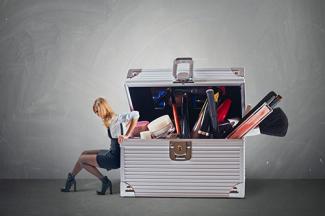
Are your heels sky-high and your bags oversized? You need to read this now. Don’t let your inner fashionista sabotage your health, says Dr Shital Raval.
Skinny Jeans: Skinny jeans can compress the nerves and muscle of the groin area, aggravate acidity/reflux, abdominal discomfort and Urinary Tract Infections (UTI). The Compartment syndrome, which is caused when the muscles become swollen and bruised, was recently seen in a case where a woman collapsed after squatting in skinny jeans. Squatting in tight pants had caused nerve damage (usually the lateral femoral cutaneous nerve), numbness (tibial neuropathy), stinging pain, lower leg swelling and dead tissue (rhabdomyolysis) in the woman’s legs. Men wearing skinny jeans are warned against twisted testicles and high temperatures in the scrotum that can lead to decreased sperm production. In hot climates, skinny pants can also lead to heat rash and fungal infections.
Fashion Rx: Wear comfortable clothing that does not constrict or compress the body.
High heels: Stilettos are known to cause bunions, heel pain, hammer toes, nerve damage, plantar fasciitis (heel pain from inflamed ligament in the foot), ankle sprains and stress fractures. The narrow toe box and height of the heels can cause uneven weight distribution on the balls of the feet.
Fashion Rx: Wear flats (with ½-inch heels) or sneakers whenever possible, such as while commuting to and from work. Choose shoes with heels that have a broad base and are padded. Massage and stretch your feet whenever you can.
Thongs: You may get rid of the dreaded VPL (visible panty line), but the tight fit and the seams of thongs cause chafing and friction against skin. Also most thongs are made of synthetic or nylon material, which do not breathe. Additionally the thin band that covers the crotch tends to move around, potentially transferring bacteria from one spot to another. This can all exacerbate the risk of fungal and bacterial infections or vaginosis.
Fashion Rx: Wear loose, comfortable cotton underwear that breathes and does not chafe.
Big bags: Oversized shoulder bags are a fashionista’s dream accessory, but healthwise they are a big no-no as they can cause back/neck pain, shoulder pain and spinal injury. On average, a big bag weights 5-7kg. Constant pressure by a heavy handbag can cause lopsided posture with uneven shoulders – the shoulder carrying the bag tends to be raised and rotated backwards. You could also get nerve compression leading to frozen shoulder. The added weight strains the spine and increases wear and tear of the joints in the legs, which can lead to arthritis.
Fashion Rx: Your bag should weigh less than 5kg. Switch shoulders so you are not carrying the bag on one shoulder all the time. Avoid cloth bags, which cause uneven distribution of the materials inside the bag.
Piercings: About 20% of all body piercings cause bacterial infection. Jewellery containing nickel or certain other metals can cause allergic reactions, and/or contact dermatitis. Cadmium, found in some earrings, is known to be carcinogenic.
Fashion Rx: Avoid piercings in sensitive parts of the body such as the mouth, breasts, genitals etc. If you choose to get a piercing done, always do so at a clinic that follows proper pre- and post-care protocol to minimise risk of infection. Additionally purchase hypoallergenic and real jewellery for piercings that can be worn for a long time. If you have an allergic reaction, get it checked out immediately and get an allergy test done.
Brazilian wax: A small study in France found that over 90% of the people who waxed or shaved down there were affected with skin virus Molluscum contagiosum, an STD. It has been seen that getting a Brazilian wax also increases the risk of infection, skin irritation, burns, ingrown hairs, folliculitis, boils, abscesses and scarring. Pubic hair cushions the very sensitive area from friction during sex, or any other trauma, and prevents dirt and pathogens from entering the vagina. Any form of hair removal irritates the hair follicles and causes microscopic cuts, and given the moist, warm environment of the genital area, makes it susceptible to bacterial and fungal growth.
Fashion Rx: It’s best to avoid pubic hair removal. You can trim it instead. If you do shave pubic hair, apply aloe vera or moisturising cream after shaving to minimise irritation. Always clean the area with a mild soap and keep it dry by wearing loose cotton underwear.
Neckties: Wearing tightly fitted ties is a risk factor for glaucoma. Neckties can obstruct the blood flow to the brain by pressing on the jugular vein causing increase in the eye pressure leading to glaucoma. The British Journal of Ophthalmology study in 2003 showed that even “slightly uncomfortably worn neckties caused an increase in intraocular pressure in 70% of the men”.
Fashion Rx: Do not wear shirts with very tight collars or tight ties. There should be a two-finger gap between your neck and the shirt collar.
Bras at night: Studies have shown that wearing bras at night can decrease the production of melatonin. Melatonin is a hormone secreted by the pineal gland that helps regulate the sleep and reproductive (menstrual) cycle and boost the immune system. Hence, do not wear bras to bed. Underwired bras can also poke you while sleeping.
Fashion Rx: Wear loose camisoles or tank tops to bed.






